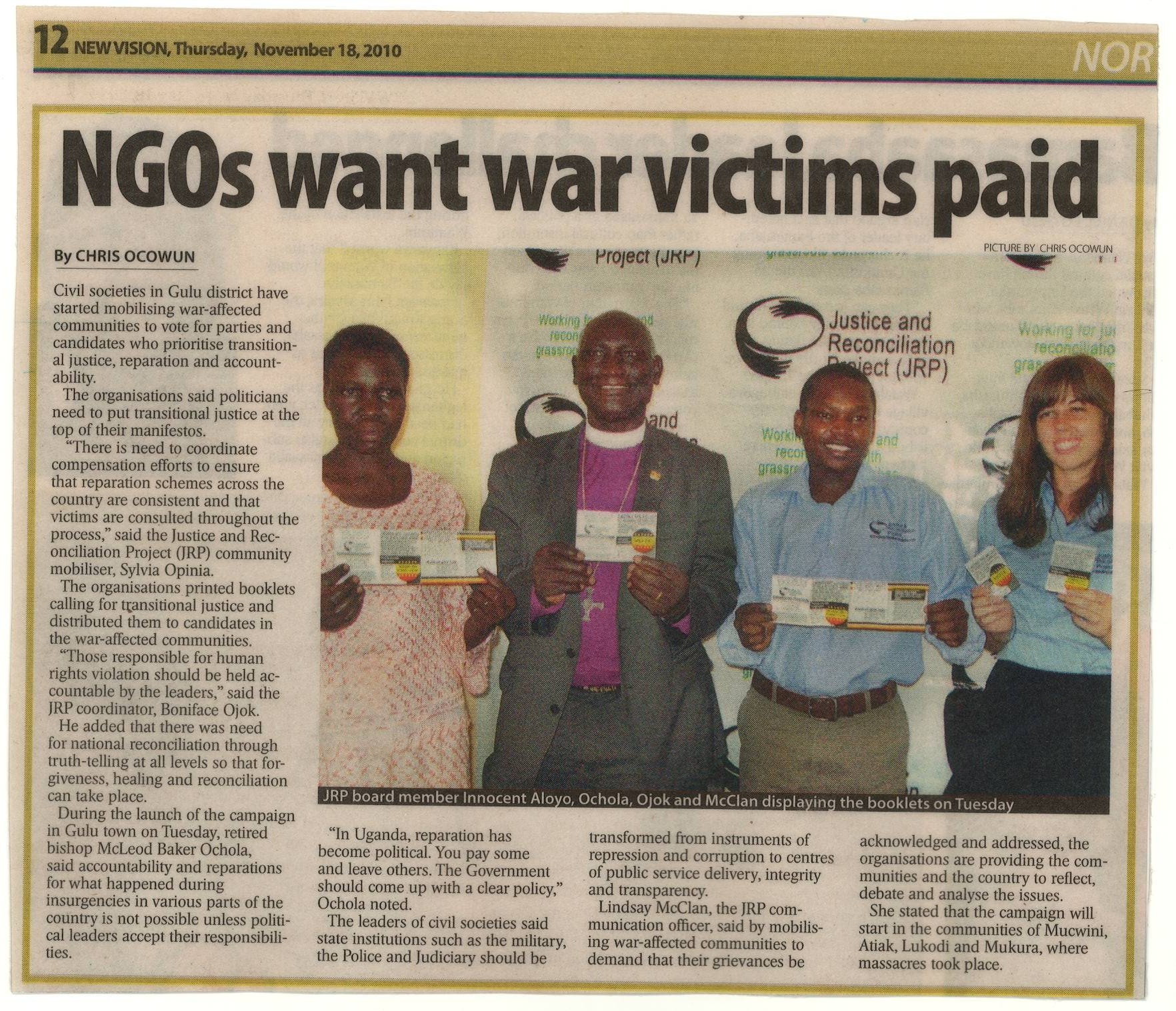“New Hope for Northern Ugandans Seeking Reparations from Government” Ugandansabroad, 13 October 2010
http://ugandansabroad.org/2010/10/13/new-hope-for-northern-ugandans-seeking-reparations-from-the-government/
By Samuel Ouga
KAMPALA, Uganda–
A team of researchers and lawyers will offer free legal services to thousands of survivors and victims of war conflicts in northern Uganda that are seeking reparations from the government.
The team, part of the network of the Northern Uganda Transitional Justice Working Group, hopes to help the victims demand compensation without any fear.
One of these lawyers is Charles Toolit Atiya, the coordinator of the group and a human rights lawyer.
“It’s obvious that after the wars, the structures, pillars and elements of justice got eroded like any other sector,” he told Ugandans Abroad. “Police work was objurgated to the military.”
The group is a large network of 120 organizations in Teso, Lango, Acholi, and West Nile regions.
Collectively, they hope to promote post-conflict justice mechanisms among survivors. Many hope the government will compensate them for the destruction of their communities, the loss of their relatives’ lives, and disabilities they acquired during the war.
The survivors include those from massacres in Atyak, Mucwini, Mukura, and in West Nile. During the Atyak massacre alone, more than estimated 250 people were killed. Many want the government to also compensate them for when the UPDF occupied their land during the insurgencies.
The group recently set up a survivors’ membership desk, which helps them register their concerns for redress, as well as document their experiences from the conflict. Atiya would like Ugandans in the diaspora to know that as much as government stepped in to re-establish the pillars of justice in the war-ravaged regions, a lot has to be done in settling offences and damages from recent conflicts.
One major problem is that survivors who are rewarded damages by the Uganda Human Rights Commission die before getting their benefits from the government, and face serious delays in the reparation process.
“We shall work days and nights to ensure that this process is expedited and made shoryer to serve the interests of the victims,” Atiya said.
Lino Owor Ogora, the research and advocacy team leader for the Justice and Reconciliation Project, which is part of the larger network, told Ugandans Abroad that although guns have gone silent, war is not over for the victims.
“There are overwhelming demands for reparations by survivors and victims of the conflicts,” he said. According to Ogora, the survivors of the 1989 massacre, have not been compensated by the government.
“In the West Nile, [the] Kony massacre survivors’ association also want compensation from the government,” he said. Many victims of the wars want to know how their friends and family died. Traditional justice can also help in settling some of the conflicts in the villages, which the organizations in the network can help facilitate.
Unfortunately, many of the survivors lack the financial resources and media coverage to pursue justice, since they are primarily impoverished relatives of those who were massacred, or victims trying to live with bullet wounds and amputated limbs.
Free legal services can be an important step in the right direction, since successfully seeking reparations is an expensive and time-consuming undertaking. Victims need support.
“These are not just straightforward cases,” said Toolit. “They are complicated and need a lot of research. And one of our fears is that of intimidation of the victims.”
The network is also pushing for a special reparation program to be created in northern Uganda to address the post-conflict needs of the region, and hope it can be coordinated with those seeking justice for war survivors in other parts of the country.
Samuel Ouga is a Ugandans Abroad reporter based in Kampala, Uganda.



